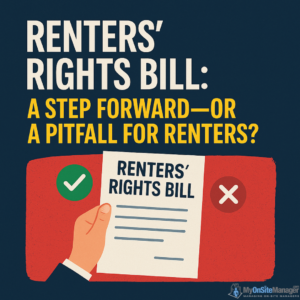The United Kingdom is on the brink of the most significant overhaul of rental laws in decades with the introduction of the Renters’ Rights Bill. Spearheaded by Labour’s Baroness Taylor of Bolton, the bill is part of a broader effort to create a fairer and more secure housing system for tenants. However, what is being touted as a pro-tenant revolution is drawing sharp criticism from landlord groups and Conservative peers, who warn that the reforms could ultimately backfire—shrinking the private rental market, driving up rents, and hurting the very tenants it aims to protect.
What’s in the Bill?
The proposed legislation outlines several major changes:
-
Abolition of Section 21 “no-fault” evictions:
Landlords would no longer be able to evict tenants without providing a legitimate reason. This is designed to offer more stability and peace of mind for renters who have long feared being displaced with little notice or justification. -
Rent regulation and dispute mechanisms:
The bill introduces greater protections for tenants facing steep or arbitrary rent increases. Under the new law, tenants would be empowered to challenge excessive hikes through formal procedures. -
Upfront cost caps:
Landlords would be limited to requesting no more than one month’s rent in advance, addressing concerns about affordability and financial barriers to entry in the rental market. -
Ban on bidding wars:
The bill seeks to eliminate competitive bidding—where prospective tenants offer to pay more than the listed rent to secure a property—a trend that’s been driving prices up, particularly in high-demand cities like London and Manchester.
Why the Government Supports It
According to Baroness Taylor, the bill is a direct response to an out-of-control rental market. She describes the current system as “the least affordable, poorest quality and most insecure part of the housing sector,” with tenants lacking basic rights and enduring substandard conditions.
The goal of the legislation is to allow renters to “put down roots,” secure in the knowledge that they cannot be evicted without cause, nor priced out of their homes with sudden rent increases. Taylor calls it a “new deal for tenants,” asserting that these reforms will create a more equitable relationship between landlords and tenants.
The Backlash: What Critics Are Saying
While tenant advocacy groups and housing campaigners support the reforms, critics—including many in the House of Lords—argue the bill could result in unintended and damaging consequences:
1. Landlords May Exit the Market
Lord Young of Cookham and other Conservative peers voiced concerns that small landlords, who make up the vast majority of the private rental sector, may be deterred by the administrative burden and perceived restrictions.
With 85% of UK landlords owning between one and four properties, they are often individuals managing rental properties as a side income or retirement investment—not large-scale professional landlords. If these landlords feel overregulated, many may choose to sell, reducing rental supply.
2. Rent Prices Could Climb Further
Critics warn that limiting rent bidding, while well-intentioned, may restrict market flexibility and lead to landlords raising asking rents upfront. Additionally, the costs of complying with new regulations may be passed onto tenants, ultimately negating the bill’s affordability goals.
3. Administrative Complexity & Legal Risks
The bill is also being criticized for being overly complex, making it difficult for both landlords and tenants to understand their rights and responsibilities. The possibility of drawn-out legal disputes could become a norm, potentially delaying the resolution of rent disputes and evictions when necessary.
A Possible Silver Lining?
Some experts, including crossbench peer Lord Best, argue that the reforms could open the door to more social housing opportunities. If private landlords leave the market, their properties could be acquired by housing associations or local authorities—especially if incentives like capital gains tax relief are introduced.
However, this optimistic view depends heavily on the government’s willingness to invest in public housing infrastructure and provide financial tools for housing associations to expand.
Balancing Act: Reform vs Reality
At its core, the Renters’ Rights Bill is about correcting a power imbalance. For too long, renters have faced instability, unaffordable housing costs, and a lack of protection in a market that favors landlords. But critics caution that solving these problems by placing too much burden on landlords could shrink the very market that tenants rely on.
If landlords exit in large numbers or tighten their screening criteria, renters may face fewer choices, higher rents, and stricter application processes. In short, the reform could shift the pressure, not remove it.
What Comes Next?
As the bill moves through the legislative process, its future hinges on parliamentary debate, amendments, and practical implementation. The stakes are high. If done right, the bill could reshape the private rental sector into a more just and transparent system. But without proper balance and safeguards, it risks destabilizing housing supply and creating new barriers for renters.
📚 Source: NewsBreak / The Independent – “Renting revamp will drive out landlords and cost tenants more, critics warn” Read the original article

